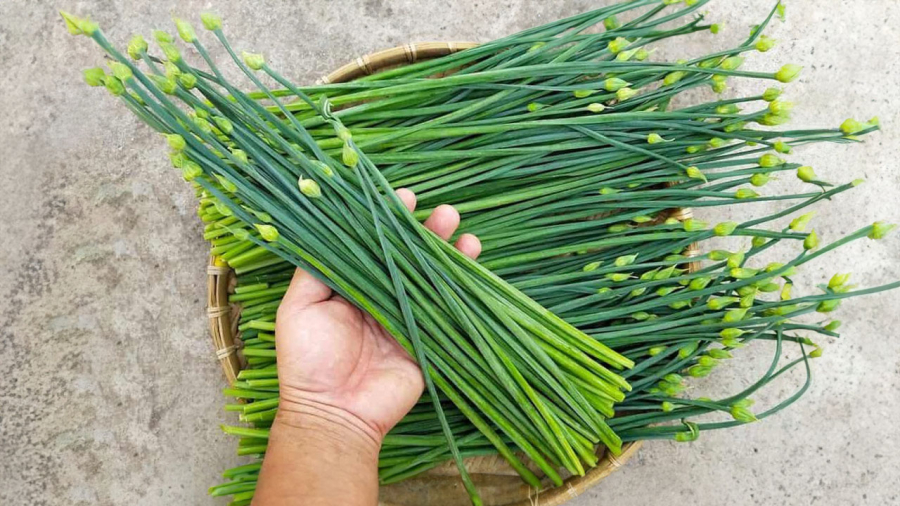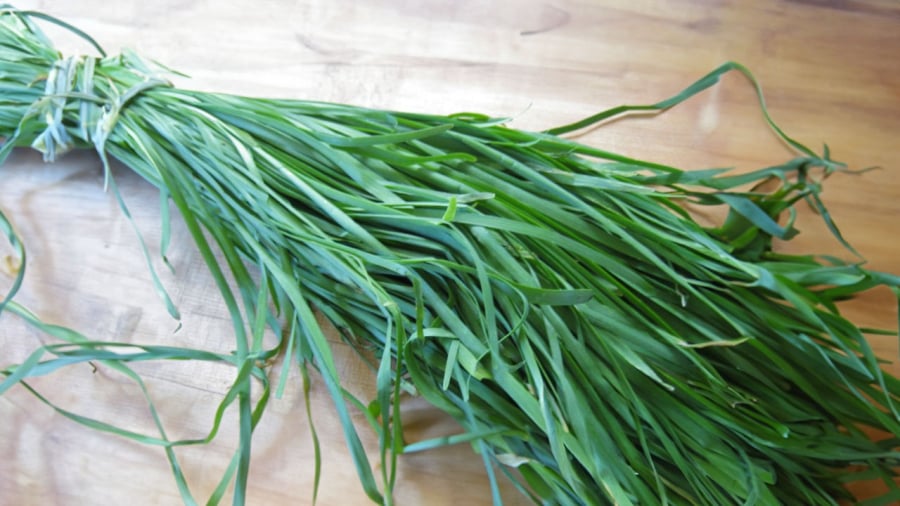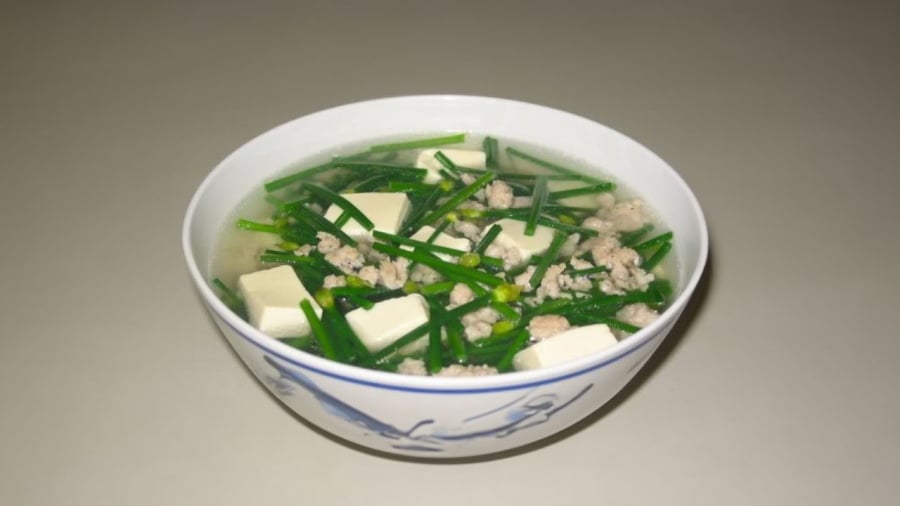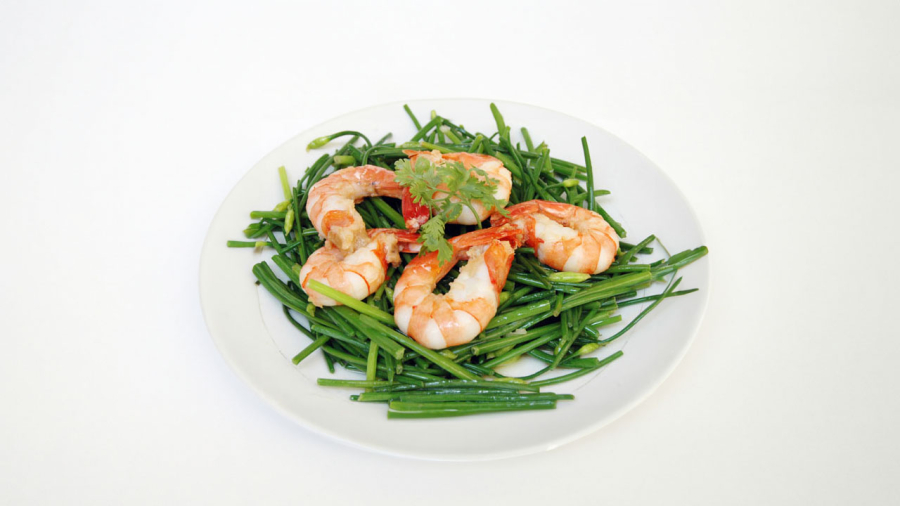Chives is a herb and also a vegetable used to cook special meat stir-fry or often used in wonton noodle soup. Chives have a distinct aroma, so in Vietnamese folklore, there is a saying “clear like a chives soup”. Chives are a well-grown plant in Vietnam. In your family, you can grow a chives plant and eat it from year to year instead of harvesting it seasonally like onions. You can pick the leaves or divide the chives to use, then the chives continue to produce branches in the pot.
Chives are easy to grow and grow well. Chives are not susceptible to pests and diseases because the smell of chives keeps pests and diseases away.

According to the World Health Ranking, the Japanese consider chives as extremely valuable food, known as the “miracle herb”. Chives in traditional medicine are called khởi dương thảo, cửu thái tử, cửu thái. The scientific name of the plant is Allium ramosum L., belonging to the onion family. Chives are believed to have the ability to treat back pain, fever, constipation, skin infections, and worm infections.
The parts used are chive leaves, chive seeds, chive roots. Used in cuisine, chive leaves and chive blossoms are extremely delicious. Chive leaves contain many vitamins and dietary fiber, helping to improve intestinal motility, support digestion, treat constipation, and prevent colon cancer. Chive leaves also have the effect of dissolving blood stasis, promoting blood circulation, and detoxifying.

Prominent benefits of chives
Antibacterial in the gut: Chives, as a natural antibiotic, help treat coughs and sore throats. When you have a cough, you can gargle with chive leaf water to reduce it. Or use chives to steam with honey and eat. Chives have many valuable compounds such as sulfur, saponins, and bitters… Especially, odorin in chives is considered as a special antibiotic for the bacteria staphylococcus aureus and Bacillus coli. You can use fresh chive leaf water to treat intestinal bacteria, sore throat, and skin acne.
Reduce blood pressure and cholesterol: Similar to garlic, chives contain natural antibiotics, such as allicin, which have the effect of reducing blood pressure and preventing the production of cholesterol (bad fat) in the body. It also has antibacterial and antifungal properties, eliminating bacteria and fungi in the intestines, ensuring good digestive system function.

Stimulate digestion: Chives used in traditional medicine help stimulate digestion, treat constipation, and diarrhea to help facilitate bowel movements. Chives are beneficial for the digestive system, good for the liver and stomach, helping you prevent constipation and stomach pain. The ingredients such as protein, fat, calcium, iron, carotene, vitamin C, and fiber in chive leaves can promote the digestion process, increase intestinal motility; thereby creating a good appetite, stimulating cravings, very suitable for constipated patients.
Support cancer prevention: Chives contain sulfur, carotene, and vitamin A, which are nutrients that can prevent the development of cancer cells and limit the spread of these cells throughout the body. Therefore, supplementing dishes made from chive leaves is highly recommended.
Enhance sexual health: Chives are known as a kidney tonic herb. The chive seeds are usually soaked in alcohol with caterpillar fungus, ginseng, and velvet antler. Chive leaves soup or drinking fresh chive leaves is also used to treat erectile dysfunction, sperm dripping, premature ejaculation: Take 0.5kg of fresh chive leaves, crush and take the juice, drink twice a day for one week. Women using chives also support gynecology very well, helping to reduce back pain, treat frequent urination, gas, and frigidity.

How to eat chives for effectiveness?
Chive leaves have a warm and spicy taste, so each time you eat, you should eat a moderate amount, not too much. Chives are used as a condiment similar to onions and garlic or used for stir-frying and cooking soup. Chives contain a lot of dietary fiber, which is not easily digested and absorbed. Eating too much at once will cause diarrhea. It is best to use only 100-200 grams per meal.
When suffering from poor digestion or stomach pain, it is advisable to limit eating chives to avoid stimulation.
Do not eat chives and drink milk at the same time; do not eat cooked chives overnight.
When processing chives, you should cut them small and stir-fry over high heat, work quickly. Stir-frying for too long will make the chives mushy and unappetizing, while causing the sulfide in chives to deteriorate.
In addition, people with eye-related diseases, inner heat, weak stomach, and acne should not eat chives.
Exploring the Benefits of Chia Seeds on Good Health: What You Need to Know
Did you know that chia seeds come from the same family as herbs that are used in spices such as mint and basil? These seeds are a popular health food due to their unique health benefits. Read on to find out how these seeds can be used and why they're so beneficial!





































